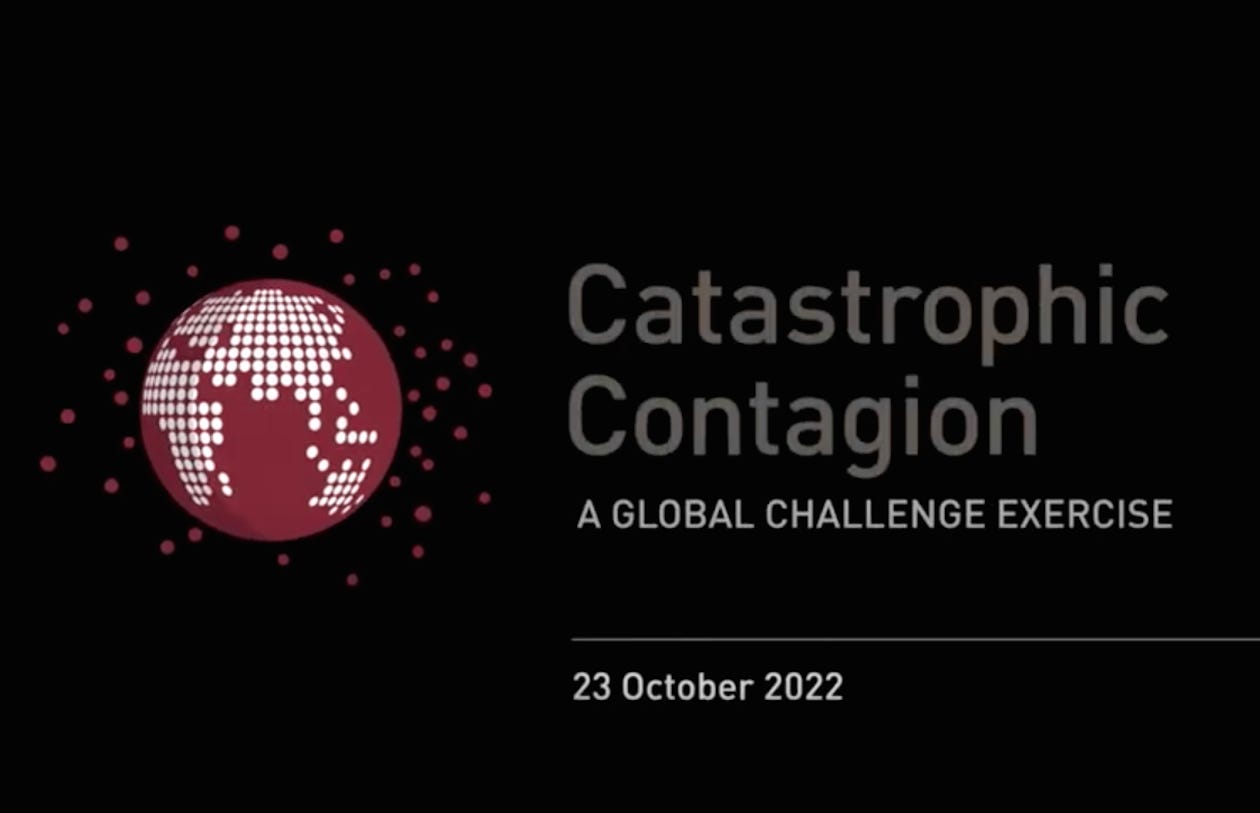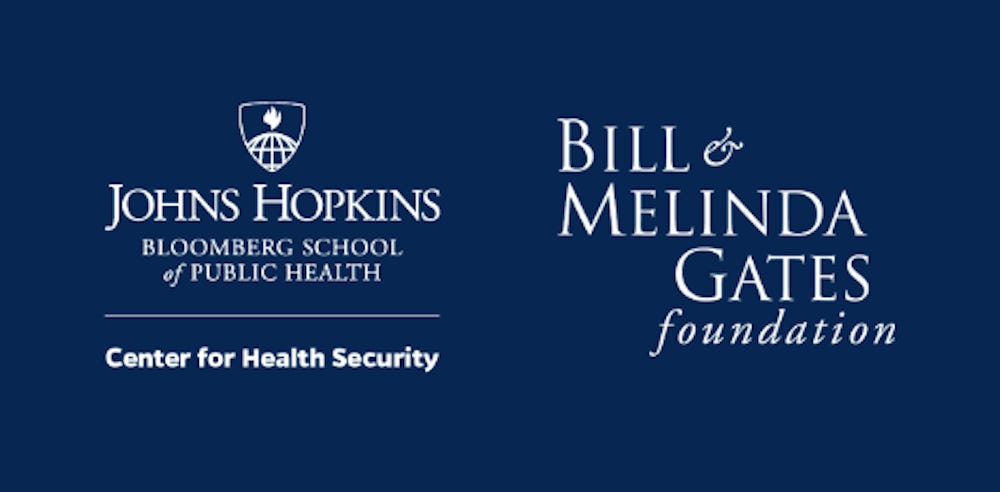Catastrophic Contagion
This is not real... YET
Share this link: http://CatastrophicContagion.com
The purpose of this article is to expose and raise awareness of yet another “tabletop exercise,” which is known as “Catastrophic Contagion.”
Please watch both videos below:
This is a “fictional scenario” that was conducted on October 23, 2022.
It was run by the people who brought you Event 201. CLICK HERE
The Global Pandemic Corps.
The “fictional scenario” takes place in 2025. Get ready!
In reality, this “tabletop exercise” is merely some poorly disguised marketing and promotional materials produced by the people who stand to profit from laws that mandate that nations conduct many, many more such “exercises.”
Who benefits? WHO benefits.
This is just another profit center for the Pharmaceutical Hospital Emergency Industrial Complex (PHEIC).
Overview
It seems like a great number of “Health Care Workers” are going to be needed in eastern Venezuela in 2025.
The people involved in the production of the videos above did not exhibit acting skills that are worthy of an Emmy, a Tony or an Academy Award, but I do believe that they should receive the following…
The information below is from the Center for Health Security website.
Lessons from the exercise
Leaders must prepare now to make difficult, critically important decisions with limited information in the early days of the next pandemic in order to increase the chances that a dangerous outbreak can be contained at the source.
In the early days of a major new contagious disease epidemic, there could be a brief window of opportunity to stop it from becoming a pandemic. To successfully contain such an outbreak, decisive and bold action would need to be taken in the face of incomplete data, high scientific uncertainty, and potential political resistance. Thinking through such challenges, preparing in advance to react effectively, and practicing through both high-level tabletop and operational exercises should start now.
It may seem like all these critical policy decisions have been resolved during the COVID-19 pandemic, but they have not. In the Catastrophic Contagion simulation, even a group of some of the wisest and most experienced international public health leaders who lived through COVID-19 wrestled with opposing views on whether countries should impose travel restrictions or close schools to try to contain a serious new epidemic that was disproportionately affecting children. The exercise raised a pivotal question: If future pandemics have a much higher lethality than COVID-19, or for example, if they affect predominantly children, would or should countries take different, stronger, earlier measures to contain it, and what are those measures?
These are not purely public health and scientific decisions; they will be made by leaders in the context of political, economic, and social realities that can be anticipated and considered in advance. Through routine simulations and operational exercises, we can strategically prepare for such challenges ahead of time. The more effectively we can reach scientific and practical consensus on the best approach to very hard but foreseeable problems, the more we will be ready in the future to protect lives and national economies. Political leaders, in addition to health leaders, must be at the table during exercises to respond effectively during the next pandemic.
Countries should establish a global network of professional public health leaders who can work together to improve epidemic preparedness and response and strive for consensus on scientific issues in advance of the next major outbreak.
There is no existing worldwide professionalized network of public health preparedness and response leaders who can work together between and during epidemics to better prepare all countries and provide mutual aid and sharing of best practices during serious epidemics. Establishing an international network of national public health leaders, along the lines of the professionalized “Pandemic Corps” referred to in our exercise, could substantially help countries save lives and livelihoods during major epidemics and recover more quickly. Political leaders, who are entrusted with keeping their citizens safe, could benefit from consensus views offered by such a group, rather than having to make impromptu, high consequence policy decisions when lives are at stake during dangerous outbreaks.
Countries should prioritize efforts to increase trust in government and public health; improve public health communication efforts; increase the resiliency of populations to misleading information; and reduce the spread of harmful misinformation. In future pandemics, we should continue to expect even more major disruptions from misinformation and disinformation. The WHO can be a globally trusted source, and it can share science and public health information widely, but we should not expect it alone to combat or put a stop to the spread of this mis- and disinformation. Countries need to collaborate to anticipate that threat and prepare to combat it with their own laws and procedures. Just as many types of economic and societal harms can be anticipated and accounted for in pandemic preparedness plans, so too can predictable false or misleading health messaging. Concertedly exploring ways to address this phenomenon on a national level in advance of the next pandemic will be crucial to saving lives.
WHO member states should strengthen international systems for sharing and allocating scarce public health resources.
Groundbreaking global collaborations, such as the ACT-Accelerator and COVAX, were launched during the COVID-19 pandemic. However, public health leaders still lack confidence in current approaches to fairly allocate medical countermeasures during a future pandemic. Even if there were a global commitment around equity for all countries, implementing equitable allocation will continue to be very difficult in the future, especially if there are practical challenges and special requirements like refrigeration or IV administration. Empowering all regions of the world to save lives during a pandemic would increase equitable access to life-saving treatments and vaccines. Therefore, we need to build up manufacturing, distribution, and administration capacities around the world, paying particular attention to countries with poor infrastructure. This should happen now, rather than during a growing pandemic.
It is clear from Catastrophic Contagion that even after the terrible impact of COVID-19, more preparedness work needs to be done, new decisions need to be made, and additional resources committed. We need to expand the limits of our ability to respond.
SOURCES:
https://www.centerforhealthsecurity.org/our-work/exercises/2022-catastrophic-contagion/index.html
https://www.centerforhealthsecurity.org/our-work/exercises/2022-catastrophic-contagion/lessons.html
https://www.centerforhealthsecurity.org/our-work/exercises/2022-catastrophic-contagion/videos.html
ANALYSIS:
If adopted (it won’t be), Article 12 of the “Conceptual Zero Draft” of the WHO’s proposed Pandemic Treaty clearly instructs nations around the world “to conduct simulation exercises.”
I fully realize the benefit of planning, preparing, and practicing in advance of any endeavor. However, very little, if any, of what is done in these tabletop exercises is truly designed to actually help improve people’s health.
This is designed to promote and enlarge yet another profit center for the Pharmaceutical Hospital Emergency Industrial Complex (PHEIC).
Many thanks to Mrs. H. for bringing this to my attention!
You are amazing!
by James Roguski
The old system is crumbling, and we must build its replacement quickly.
If you are fed up with the government, hospital, medical, pharmaceutical, media, industrial complex and would like to help build a holistic alternative to the WHO, then feel free to contact me directly anytime.
JamesRoguski.substack.com/about
JamesRoguski.substack.com/archive
310-619-3055
All content is free to all readers.
All support is deeply appreciated.















Only “pandemics” that we will experience are those being created by the groups that profit from them.
yeah, just what we need, professionalized “Pandemic Corps.” like they did such a good job with this one! actually, if you did the opposite of what they advised, you were two steps ahead.
i'm sure if they just had more of our money, they would do a better job (not)